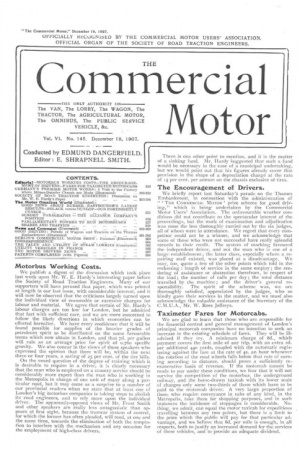Motorbus Working Costs.
Page 1

If you've noticed an error in this article please click here to report it so we can fix it.
We publish a digest of the discussion which took place Last week upon Mr. W. E. Hardy's interesting paper before the Society of Road Traction Engineers. Many of our .supporters will have perused that paper, which was printed at length in our last issue, with considerable interest, and it will now be observed that the criticisms largely turned upon the individual view of reasonable or excessive charges for labour and material. We agree that certain of Mr. Hardy's labour charges are too low for London, but he admitted that fact with sufficient care, and we are more concerned to follow the likely directions in which economies can be effected hereafter. We have every confidence that it will be found possible for supplies of the heavier grades of petroleum spirit to be distributed on the same favourable terms which now obtain in London, and that 7d. per gallon will rule as an average price for spirit of 0.760 specific gravity. We also concur in the views of those speakers who expressed the opinion that there will be, within the next three or four years, a saving of 25 per cent, of the tire bills.
On the vexed question of the degree of training which it is desirable to require in a driver, it is clearly necessary that the man who is employed on a country service should be considerably more expert than the man who is working in the Metropolis in charge of one unit of many along a particular road, but it may come as a surprise to a number of our provincial readers when we state that at least one of London's big Motorbus companies is taking steps to abolish its road engineers, and to rely more upon the individual driver, The apparently-opposed views of Mr. Frost Smith and other speakers are really less antagonistic than appears at first sight, because the tramcar system of control, for which the former has often pleaded, will tend, at one and the same time, towards the elimination of both the temptation to interfere with the mechanism and any occasion for the employment of high-class drivers. There is one other point to mention, and it is the matter of a sinking fund. Mr. Hardy Auggested that such a fund would be necessary in the case of a municipal undertaking, but we would point out that his figures already cover that provision in the shape of a depreciation charge at the rate of 55 per cent, per annum on the chassis exclusive of tires.
The Encouragement of Drivers.
We briefly report last Saturday's parade on the Thames Embankment, in connection with the administration of " THE COMMERCIAL MOTOR prize scheme for good driving," which is being undertaken by the Commercial Motor Users' Association. The unfavourable weather conditions did not contribute to the spectacular interest of the proceedings, but the work of examination and adjudication was none the less thoroughly carried out by the six judges, all of whom were in attendance. We regret that every competitor could not be a winner, and we acknowledge that some of those who were not successful have really splendid records to their credit. The system of marking favoured the independent driver, and not the man who is one of a large establishment ; the latter class, especially where a repairing staff existed, was placed at a disadvantage. We may, too, quote a few of the other points which told in the reckoning : length of service in the same employ ; the rendering of assistance or abstention therefrom, in respect of the load; the number of calls per day ; the total distance travelled by the machine; and the driver's general responsibility. The spirit of the scheme was, we are thoroughly satisfied, appreciated by the judges, who so kindly gave their services in the matter, and we musf also acknowledge the valuable assistance of the Secretary of the C,M.U.A., Mr. W. Rees Jeffreys.
Taximeter Fares for Motorcabs.
We are glad to learn that those who are responsible for the financial control and general management of London's principal motorcab companies have no intention to seek an increase in the existing schedule of fares. They will be illadvised if they try. A minimum charge of 8d., which payment covers the first mile of any trip, with an extra 2d. per additional 440 yards, coupled with the automatic registering against the fare at the rate of 45. an hour whenever the rotation of the road wheels falls below that rate of earning according to distance, should_ prove a sufficiently remunerative basis of revenue. If the motorcab cannot be made to pay under these conditions, we fear that it will not survive the competition of the motorbus, the underground railway, and the horse-drawn taxicab with its lower scale of charges only some two-thirds of those which have to be paid to the motorcab driver. A very large proportion of those who require conveyance in cabs of any kind, in the Metropolis, take them for shopping purposes, and in such instances the incidence of stoppages is considerable. Nothing, we admit, can equal the motor taxicab for expeditious travelling between any two points, but there is a limit to the price which the public will pay for that particular advantage, and we believe that 8d. per mile is enough, in all respects, both to justify an increased demand for the services of these vehicles, and to provide an adequate dividend.




















